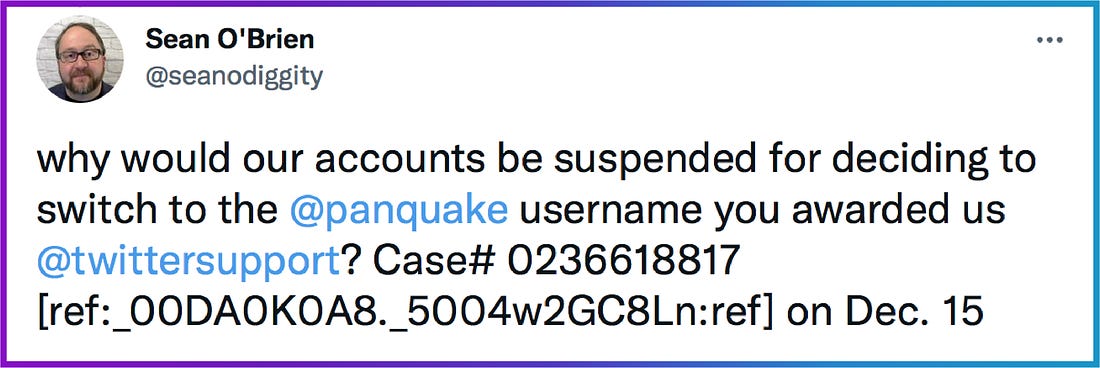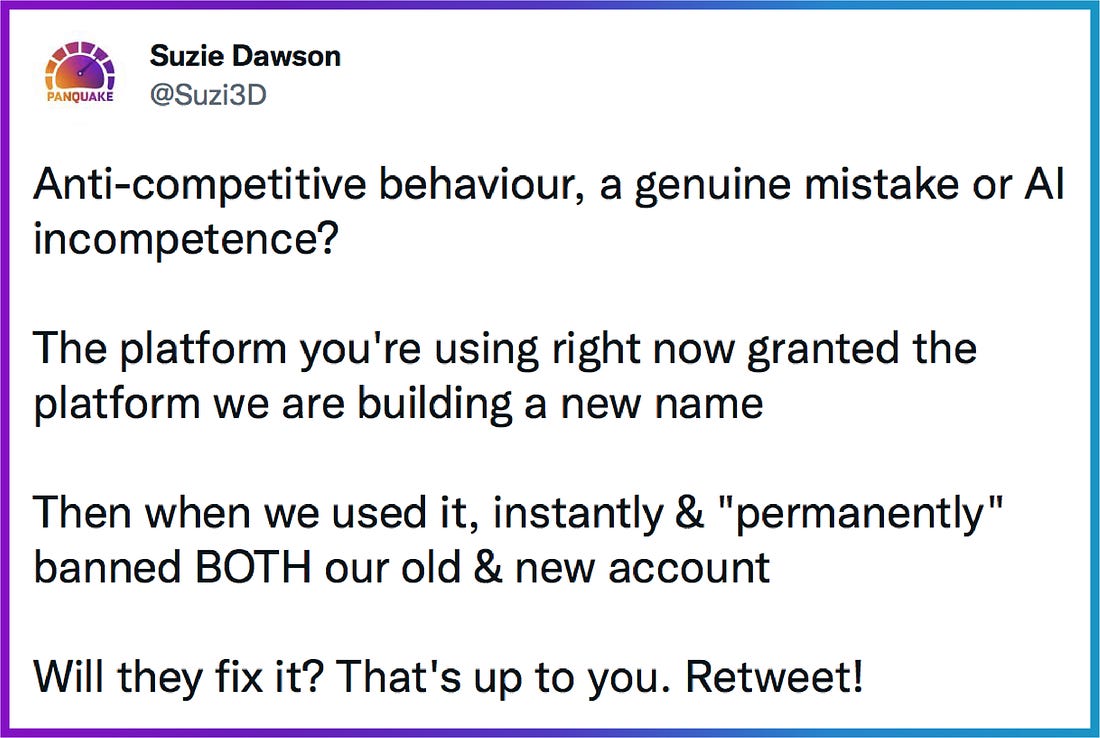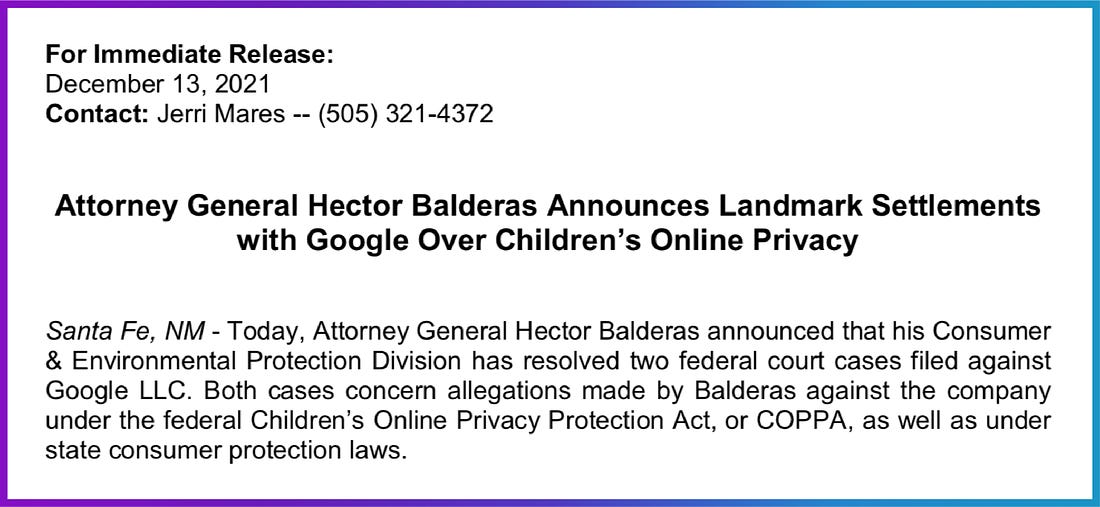The popular new social media alternative that is under development panquake.com was permanently suspended on Twitter immediately after Twitter offered a new handle to the panquake.com account owners. The next-generation social media site changed its Twitter handle from @pan_quake to @panquake following months of communication with Twitter admins. However, shortly after the transfer to @panquake both the old and new accounts were banned
Panquake has received donations from thousands of people who are eager to begin using the new platform. Additionally, panquake.com is endorsed by high profile figures including Jimmy Dore, Bill Binney, Lee Camp, Kim Dotcom and many others.
Panquake Chief Security Officer Sean O’Brien, founder of the Yale Law School Privacy Lab, tweeted to Twitter Support: “why would our accounts be suspended for deciding to switch to the @panquake username you awarded us @twittersupport?”
Panquake Founder and Chief Product Officer Suzie Dawson said:
“Anti-competitive behaviour, a genuine mistake or AI incompetence? The platform you're using right now granted the platform we are building a new name. Then when we used it, instantly & "permanently" banned BOTH our old & new account. Will they fix it? That's up to you. Retweet!”
This is the second time Twitter has banned its competitor from the platform. In March 2021 Twitter suspended Panquake and its staff’s Twitter accounts, ultimately reversing the decision and apologizing, calling it an error.
Big Brother’s Playground: Surveillance in schools increasing
CCTV surveillance camera systems are being implemented throughout schools at an increasing rate. The practice is reportedly intended to maintain security and safety on school grounds. Yet the surveillance is also targeted at students to prevent vandalism and to address bullying, proponents claim.
However, surveillance in schools has many privacy advocates, teachers and the general public very concerned. In September this year, Belfast Royal Academy was forced to remove cameras from the boys’ restroom following complaints from parents. Similarly, in 2011, a secondary school in Kildare, Ireland, was also forced to remove cameras from student restrooms after parents issued complaints to the Data Protection Commissioner.
According to The Irish Times, CCTV companies claim new schools are being offered cameras as a standard security measure. Primary school teacher and researcher Lisa Kelly told The Irish Times, “The high-security regimes existing in schools that teach predominantly working-class pupils, may indicate an inherent lack of trust for these pupils.”
Research by the University of Salford indicates students in the UK are now surveilled as often as inmates and airport passengers.
Google opts to settle lawsuits over child privacy violations
Mega-corporation Google has escaped accountability for allegedly violating the privacy of younger users. The Attorney General of New Mexico and Google announced a settlement following allegations that the company ‘violated the Children's Online Privacy Protection Act (COPPA) and New Mexico state consumer protection laws.’ As part of the settlement, Google agreed to provide 3.8-million dollars to establish a new initiative aimed at online safety and privacy for children.
According to the report, the settlement is ‘mostly a victory for Google,’ which gets its name on a new online safety project. Attorney General Balderas stated in a press release, “... we’re able to partner with Google in our shared commitment to innovation and education.” Initially, Google faced two federal court cases in New Mexico, but the corporation is now teaming up with state officials to begin the new initiative.
Facial recognition technology used to track Covid-19 patients in South Korea
South Korea will test out a new program using artificial intelligence and facial recognition technology to track people who tested positive for Covid-19. Thousands of closed-circuit video cameras will be used to trace the movements of COVID-positive South Koreans.
The government-funded project will be implemented in Bucheon, a heavily populated city outside of Seoul, the country’s capital. According to Reuters, “The system uses AI algorithms and facial recognition technology to analyze footage ... to track an infected person’s movements, anyone they had close contact with, and whether they were wearing a mask.”
According to the 110-page business plan, the system is intended to reduce how often contact tracers have to rely on testimony from COVID patients. However, human rights and privacy advocates and some South Korean lawmakers are concerned that the program may misuse the data gathered for purposes beyond just public health.
South Korean legislator Park Dae-chul told Reuters, “The government’s plan to become a Big Brother on the pretext of COVID is a neo-totalitarian idea ... It is absolutely wrong to monitor and control the public via CCTV using taxpayers’ money and without consent from the public.”
The country is currently experimenting with other uses for AI technology. The pilot program is expected to take effect in January 2022.
European Members of Parliament tackle Big Tech monopoly power
Debates surrounding the Digital Markets Act among members of the European Parliament pose a challenge to Big Tech gatekeepers seeking to eliminate competition within the sector. The Digital Markets Act intends to allow for new companies to enter the market more easily. For instance, new regulations within the act prevent large corporations from favoring particular services.
German MEP Andreas Schwab said, “We have been seeing in the last 11 years that the European Commission in applying competition policy was not very successful because they were always running behind companies like Apple, Google or Facebook.”
Additionally, the proposal would penalize companies failing to comply with the regulations with a penalty of up to 10% of the company’s turnover. Director of legal and economic affairs at the European Consumer Organization Agustin Reyna says the measures within the Digital Markets Act are a ‘positive step.’ Meanwhile, Big Tech companies argue such restrictions prevent innovation, but according to the report, many MEPs believe this move will mean more rights for users and ‘more democracy.’
The European Parliament is expected to vote on the matter Wednesday December 22.
UK’s Online Safety Bill to further restrict content
The UK government’s Online Safety Bill proposal suggests incarcerating tech executives if they fail to follow the regulations outlined in the bill. The proposal holds companies like Twitter, Facebook, Google and even smaller website owners accountable for the content posted to their platforms. This includes content that is illegal and content that is deemed ‘harmful.’
Ofcom recommends that platforms be held responsible for users sending unsolicited photos, content that encourages self-harm and also suggests creating an age barrier to accessing adult content websites. Should the bill pass, platforms that refuse to observe such recommendations could see their senior managers face criminal charges.
The Online Safety Bill, which was first announced in May of this year, is intended to regulate harmful content for Internet users of all ages. The regulations are to be imposed on the tech companies forcing them to regulate content on their platforms. UK Members of Parliament will have two months to examine the bill before casting a vote.
Dating app Grindr fined for data privacy violation
Norway’s Data Protection Authority (DPA) issued the dating app Grindr a 65 million Norwegian Crown fine for violating user data privacy regulations. The US-based LGBTQ+ dating app allegedly disclosed user data to advertisers. The US-based company was originally expected to pay a 7.14 million Norwegian Crown fine but maintains that it strongly disagrees with the decision.
The DPA was to fine the company 100 million Crowns last January but chose to reduce the amount due to new information on Grindr’s finances as well as learning additional information on the company’s changes undertaken to remedy its business practices regarding ‘consent-management.’
According to Reuters, head of the DPA's international department Tobias Judin said, “Our conclusion is that Grindr has disclosed user data to third parties for behavioral advertisement without a legal basis.” However, Grindr disagrees with this conclusion and is considering appealing the decision.
Clearview AI breached French privacy law
Facial recognition company Clearview AI is under fire once again for privacy violations - this time in France. The French data privacy watchdog organization Commission Nationale de l'Informatique et des Libertés or CNIL has ordered the US-based company to cease its collection and use of data of people in France.
CNIL claims Clearview AI’s public database of images violated the European Union’s General Data Protection Regulation or GDPR. According to the report, the GDPR can apply in some regions where the data of EU-based users are collected and processed regardless of if the provider is not physically present within the EU.
The French regulator claims the company did not request consent prior to collecting online images, which are being placed within a search engine that is used by law enforcement and intelligence agencies during investigations.
EU law allows its citizens to request their personal information be removed from privately-owned databases. The CNIL is allowing Clearview AI two months to adjust to its requests or the company could face sanctions.
That concludes Your Worldwide INTERNET REPORT for this week!
Remember to SUBSCRIBE and spread the word about this amazing news service.
This issue of Your Worldwide INTERNET REPORT was written by Taylor Hudak; Edited by Suzie Dawson and Sean O’Brien; Graphics by Kimber Maddox; with production support by David Sutton.
Talk Liberation - Your Worldwide INTERNET REPORT was brought to you by Panquake.com. We Don’t Hope, We Build!
© Talk Liberation CIC Limited. The original content of this article is licensed under a Creative Commons Attribution-ShareAlike 4.0 International license. Please attribute copies of this work to “Talk Liberation” or talkliberation.com. Some of the work(s) that this program incorporates may be separately licensed. For further information or additional permissions, contact licensing@talkliberation.com


